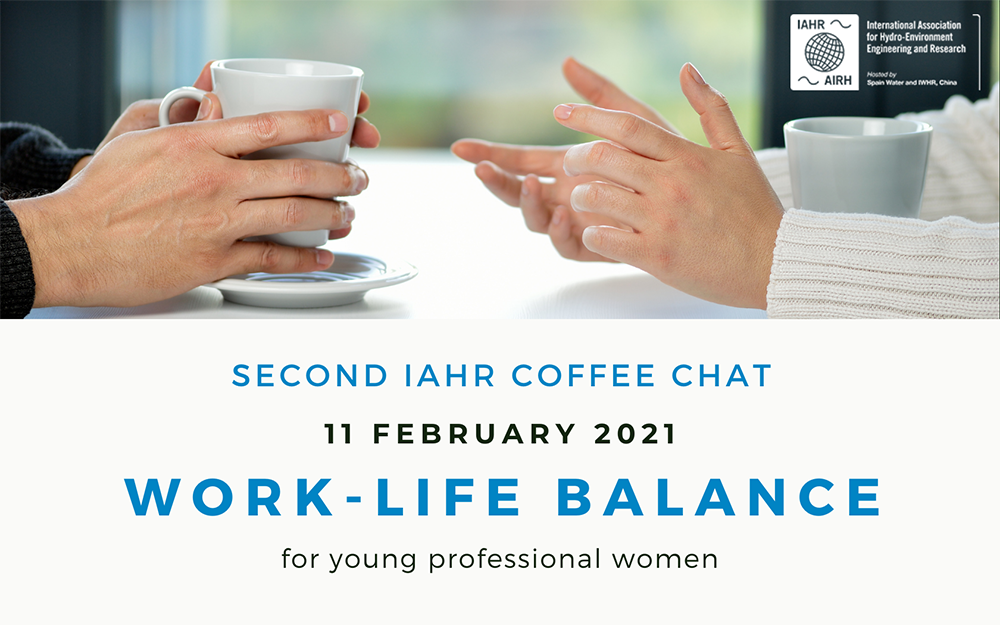[IAHR Talks] Interview with Isabella Schalko. Focus on Women and Girls in Science
#IAHRTalks
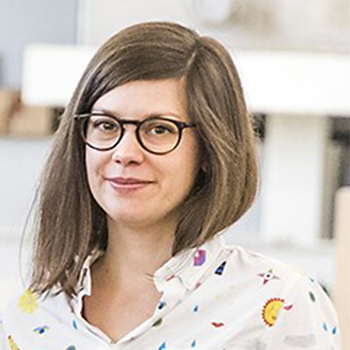 Dr Isabella Schalko, IAHR member since 2017, and member of the IAHR technical committees on Fluvial Hydraulics, Fluid Mechanics and Ecohydraulics, shares some highlights of her career with us and tells us all about the IAHR Coffee Chat series and the upcoming 2nd IAHR Coffee Chat that will take place on 11 February to celebrate the International Day of Women and Girls in Science.
Dr Isabella Schalko, IAHR member since 2017, and member of the IAHR technical committees on Fluvial Hydraulics, Fluid Mechanics and Ecohydraulics, shares some highlights of her career with us and tells us all about the IAHR Coffee Chat series and the upcoming 2nd IAHR Coffee Chat that will take place on 11 February to celebrate the International Day of Women and Girls in Science.
David Ferras, vice-chair of the IAHR technical committee on Education and Professional Development, interviews Isabella Schalko.
When, how, and why did your interest in hydro-environment start?
My interest in hydro-environment sparked during my bachelor studies in Environmental Engineering in Vienna. In the second year, we had a two-week course on river engineering and flow measurements that was very hands-on. I found it very impressive to observe the flow processes and finally to quantify our observations. To me, as an experimentalist, the exciting part of flume experiments is that you can easily see the very physical phenomena that helps you then understand the specific problem you are working on and finally find a solution.
You did your PhD on the assessment of large wood in rivers. What are the main risks related to it?
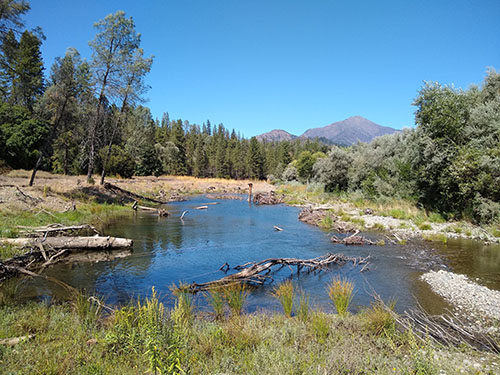 In general, large wood or driftwood is a central component of a river ecosystem. Large wood only represents a hazard if the transported large wood volume exceeds the transport capacity of a river and if large wood blocks certain river infrastructures. During the 2005 flood in Switzerland, the increased large wood transport led to a number of accumulations at weirs or bridges that resulted in additional flooding of the surrounding area or damage to the structures themselves. Such floods are, however, extreme events, so it is very important to choose a management strategy that takes into account both benefits and hazards associated with large wood in rivers.
In general, large wood or driftwood is a central component of a river ecosystem. Large wood only represents a hazard if the transported large wood volume exceeds the transport capacity of a river and if large wood blocks certain river infrastructures. During the 2005 flood in Switzerland, the increased large wood transport led to a number of accumulations at weirs or bridges that resulted in additional flooding of the surrounding area or damage to the structures themselves. Such floods are, however, extreme events, so it is very important to choose a management strategy that takes into account both benefits and hazards associated with large wood in rivers.
You have spent one year and a half as a postdoc at MIT; what are your takeaways from this experience (from a scientific, professional, and personal standpoint)?
My postdoc at MIT working with Prof. Heidi Nepf was a great experience. I met her during the Master Class at the River Flow Conference in 2016 and contacted her later on, when I was looking for postdoc positions. The postdoc was funded under the Early Postdoc.Mobility SNF (Swiss National Science Foundation) fellowships scheme and enabled me to widen my research focus and study the flow structures and wake characteristics of wood placements to inform river restoration efforts. Compared to my rather application/engineering-oriented doctorate at the Laboratory of Hydraulics, Hydrology and Glaciology at ETH Zurich, it was more basic-research oriented and focused on environmental fluid mechanics.
During my postdoc, I also had the opportunity to visit the restoration efforts at the Trinity River by the Yurok Tribe in Northern California. This allowed me to link my research to real-world examples and exchange with river engineers about how to implement wood as a tool for river restoration.
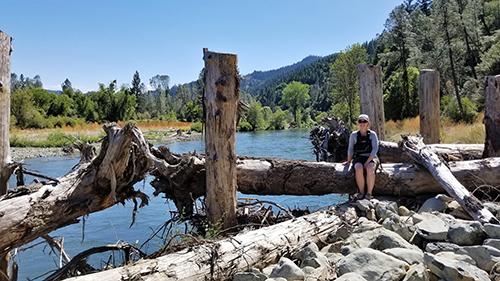
From a professional development point of view, a benefit from MIT is that there is a great offer of career-related events that you can join and support from postdoc advisors that help you make the right decisions for your career path. One of the events I attended was the “Path of Professorship” workshop for women graduate students and postdocs. It was probably the first and only time I was in the same room with 20 women professors and it was inspiring to hear more about their careers and their different stories.
Personally, it was quite an interesting experience to live in the US for 1.5 years. Prior to COVID-19, I also took the opportunity to travel a bit and get to know the US. Unfortunately, part of my postdoc was during COVID-19 and other political events in the US (e.g., the Black Lives Matter Movement), so it was sometimes difficult to focus on my research. During that time, the MIT community was very supportive and organised several online events to still feel connected. In addition, they were pretty fast in ramping up the research again and I was able to finish my flume experiments before I moved back to Zurich, Switzerland.
How has IAHR helped thus far in your career development?
As mentioned, I met Prof. Heidi Nepf during River Flow, which is an IAHR conference. So the networking possibilities that international associations like IAHR enable are a great opportunity to work on your personal career development. Additionally, during my doctorate at ETH Zurich, I attended my first IAHR World Congress in Kuala Lumpur (2017) and was very impressed by the large community and the conference, in general. My doctoral supervisor, Prof. Robert Boes, motivated me to sign up for the “JFK Paper Competition”. So several established researchers came to my talk and it was an exceptional opportunity to share and promote my research.
Other great events are the master classes during the River Flow conferences. I attended Prof. Heidi Nepf’s and Dr Alexander Sukhodolov’s Master Class in 2016 in St. Louis, and was able to receive feedback from them on my doctoral research, but also get to know them and start to establish my own research network. Also at that conference, Prof. Ellen Wohl gave a keynote lecture on wood in rivers and its benefits. Her talk was very inspiring and motivated me to reach out to her one year later. She then agreed to be one of my co-examiners for my doctorate and an external advisor for my postdoc at MIT.
What IAHR Technical Committees are you following and why? Are you involved in any on-going or planned activity related to an IAHR Technical Committee?
I am involved in the Fluvial Hydraulics, Fluid Mechanics and Ecohydraulics Committees as they align to my research interests. However, up to now I have not been very active, but I am looking forward to changing that during the upcoming IAHR World Congress in 2022.
For the initially planned 2020 IAHR World Congress in Granada, Dr Daniel Valero and Prof. Mário Franca reached out to Dr Heide Friedrich and me to organise a special session on measurement techniques in the laboratory, but also focusing on accounts of what can go wrong during experiments or DIY installations, so the audience could benefit from other experiences. As the conference has now been postponed, we are currently working on an IAHR White Paper on the state of hydro-environment observations and measurements. The nice part of this White Paper is that it is written as a cross-community effort with contributions from a wide range of researchers.
Are you involved in the recently created IAHR task force on Strengthening Gender Equity? Do you think this task force is absolutely necessary? Why?
Prof. Silke Wieprecht sent out an email about half a year ago to create a mosaic picture of the female researchers/engineers in IAHR along with the invitation to send her ideas on gender equity. So I took this opportunity and shared with her (and Prof. Heidi Nepf) the idea of an “online coffee chat” that would give young women engineers the opportunity to talk with established women researchers, women role models, about career topics. During my postdoc I was in the very fortunate situation of being able to work with Prof. Heidi Nepf who, as a female professor is a role model for me. As the engineering community is dominantly male, having a woman PI is very rare. So my motivation is to give young female engineers the opportunity to meet female role models and benefit from their experience within the framework of the coffee chat. While there are a number of career topics everyone is concerned about, there are some additional topics that are of special interest for women. Therefore, I am now collaborating with the IAHR task force on Strengthening Gender Equity in the frame of this IAHR Coffee Chat.
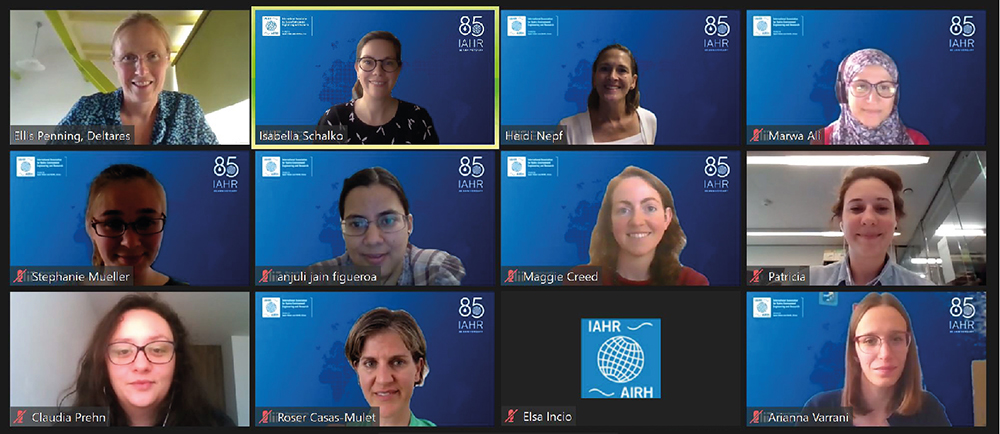
Next 11 February is the International Day of Women and Girls in Science. For this occasion you are organising the 2nd IAHR Coffee Chat, this time focusing on work-life balance for young professional women. Could you tell us more about it?
I’m very excited about this second coffee chat. This time, it will be organised in the form of a webinar, so more people can join the discussion. Participants are asked to send us their questions in advance, so I can make sure that I actually ask the questions they are interested in. Prof. Virginia Ruiz-Villanueva, who is an Assistant Professor at the University of Lausanne, and Prof. Silke Wieprecht of the University of Stuttgart will then share how they are successful researchers, while still maintaining a healthy work-life balance.
The topic sounds very appealing to me too, so I have registered! Would you recommend it also for men?
It’s great that you are interested! The target audience are young women engineers. As mentioned before, the hydro-environment community is dominated by men and so the majority of keynote speakers or invited speakers in general are male. The intention, therefore, is to provide an informal environment, where young female professionals can get to know established women researchers. However, we also aim to provide an inclusive event, so of course, interested men are also welcome to join the discussion. It’s true that work-life balance is a topic that concerns everyone, but it may also be useful to find out about questions or concerns that mainly stem from women. In general, I think the work on gender equity is not restricted only to women but a topic for all of us.
Would you suggest joining any other activities around the International Day of Women and Girls in Science?
Of course! The entire program looks very interesting. I plan to join the “Equality in Science, Technology, and Innovation: Global Trends and Challenges” session.
Our members, their views, knowledge, commitment, and experiences are what make IAHR a global leading association of hydro-environmental engineers, experts, researchers, and organisations. IAHR members’ voices and concerns guide the association on its continuing path towards a better future for water and the environment. Our members have a lot to contribute and we are listening to them so that we can put our collective voice forward.
